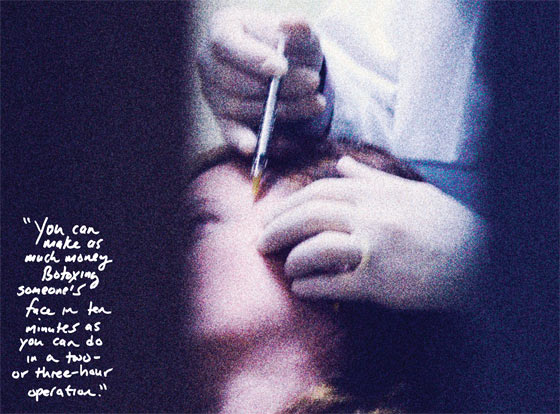
Liposuction is my least favorite procedure. It’s boring. I hate it. As long as you don’t do something catastrophically bad, like perforate the colon, it’s totally mindless. It’s also totally oversold. It’s not a cure for obesity, even though a lot of people think it is. It’s an operation for thin people who have pockets of fat that are stubborn and don’t go away. If you’re actually overweight, it doesn’t work. You cannot remove enough fat, and if you do, then they have extra skin. Fifty percent of people who come in for lipo, I tell them they don’t need it. But you have a lot of practitioners who do lipo who aren’t plastic-trained surgeons—and if they’re overaggressive in how they liposuct, they can get all that rippling where the skin has this sort of waviness to it. And that’s very, very hard to correct. Then there are variants to liposuction like smart lipo and laser lipo. Supposedly they break up the fat cells better to increase your yield. Mind you, none of them have actually been proven to be better. The only thing that’s been proven is it can shorten operating time.
Botox takes minutes. That’s why people love doing it. The amount of money you can make and the amount of time you spend is unparalleled. You can make as much money Botoxing someone’s face in ten minutes as you can do in a two- or three-hour operation. The majority of women who come in for that are exceptionally savvy. They’ve had it done before. Some of them will tell you how much of it they want. And that is when you are completely a technician. You’re just like a cog.
Rhinoplasty is my favorite. It’s like you’re a sculptor. It’s a very difficult operation to do well—a millimeter or two millimeters more or less is a vast, vast difference. But rhinoplasty is one procedure that if people were to see it, they would not have it done. The whole skeleton of the nose has to be manipulated. It’s bloody, because the nose is supervascular. You fracture the nose with your hand, and you’ll hear it when you’re in the OR—I mean, it cracks, just like if you punch someone in the face. Then you set those bones back to the position that you want. Then you do more intricate work like trimming the cartilages—and if you over-trim, then the nose is very hard to recover. You use all the primitive tools: like a hammer, a chisel, a rasp, which is like a file. And you can completely botch it. If you over-reset any of the elements, you can get collapse of the nose. There are people who specialize in just doing secondary and tertiary rhinoplasties because lots of rhinoplasties go bad.
Breast augmentation? That’s the most popular, even though a lot of people have the wrong idea about augmentations. They don’t know that implants are not a lifetime device and that you’re going to have to have them replaced. If you have them at 20, you’re probably going to have to have four or five revision surgeries over the course of your life. Still, it’s a relatively quick and simple operation. What’s problematic is when the patient is unhappy with the implant size. That’s the thing that can make you sweat. Some women end up saying, “I wanted to be a C-cup.” And you look at them and say, “You are a C-cup.” And they’re like, “I’m a small C. I wanted to be a large C.”
I’m not going to try and pretend like physicians are always professional. I mean, especially in surgery. It’s a bunch of guys—mostly, still. It’s not a “hot or not” conversation because, I mean, really, what percentage of patients are actually hot? But it’s “hotter,” “better,” you know?
We’re all typically in the business of telling people who say “I want this,” “Yeah I can do that.” The other week, we did a face-lift on a woman in her eighties. It was her fifth face-lift. She knew exactly what she wanted. If you’re going to be a cosmetic surgeon, you have to be able to turn off the “You don’t need that!” in your brain. People ask me about Heidi Montag scenarios. I think we’ve been completely defined as sort of unethical and opportunistic people, without real regard for the people that we take care of.
You could ask, “Did Michael Jackson need a rhinoplasty?” Probably not. But he wanted one. If you look at his first rhinoplasty, it was very nice, restrained. But your client is Michael Jackson, and he keeps coming back to your office, so you keep going and all of a sudden it looks like a disaster.
So when you ask, Is it Heidi Montag’s fault or Michael Jackson’s fault—or is it the surgeon’s fault for not telling them?—you’re in a gray area. My personal opinion is, it’s always on you. You did it.
As for my own views on physical beauty? You know, breast augmentation can be done well, and it can look very good, and it can feel good. And I guess the knowledge of that has changed me a little. Once you do it all the time, you get desensitized to it. When I walk down the street now, I look at people and I think, “I can do this, I can do that.” That’s a curse. You become hypercritical. My wife—when I’m just standing there looking at her, if I’m not saying anything for a while, she’ll be like, “What? What? You’re trying to … !” I’ll say, “No, I’m not!” But that does sort of happen.
As told to Robert Kolker